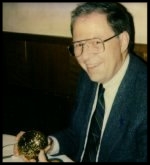1991: Wurtz
The Minerva Foundation awarded Dr. Robert H. Wurtz, chief of the Laboratory of Sensorimotor Research at the National Eye Institute (NEI) in Washington, D.C., its 1991 Golden Brain Award for seminal research that revealed how the brain processes visual information and controls eye movement.
Wurtz was the seventh recipient of the Golden Brain Award. When announcing Wurtz's selection, Minerva Foundation Executive Officer Elwin Marg said, "Robert Wurtz, a pioneer in neurophysiology, has made an extraordinary contribution to our understanding of how the brain works at the level of the single cell."
Wurtz and his collaborators were the first to identify parts of the brain that control certain eye movements and describe the relationship of binocular disparity (close v. far vision) to optic flow stimulation. His research suggested that certain "very smart neurons" in the brain guide us in moving through the environment, helping us especially with depth perception."When you walk down the hall, you don't consciously notice the visual information you get--what we call the optic flow--but many different brain cells are processing this information in such a way as to keep you from bumping into the wall," explained Wurtz.
Wurtz studies the organization of the visual and oculomotor system in monkeys as a means of inferring how the human brain perceives motion and controls eye movements. Visual perception and eye movement in monkeys and humans are virtually identical.
While his primary goal was to understand how the brain is organized to produce behavior, Wurtz said his research can have shorter-term practical results: "By understanding how the circuits in the brain function, we hope to be able to suggest where deficits might be and possibilities for treating diseases and disorders, such as stroke."
A member of the National Academy of Sciences and the past president of the Society for Neuroscience, Wurtz earned a bachelor's degree from Oberlin College in 1958 and a doctorate from the University of Michigan in 1962. From 1962 to 1965 he was a research fellow at Washington University in St. Louis. He worked at the National Institute of Mental Health before joining the NEI in 1978.

